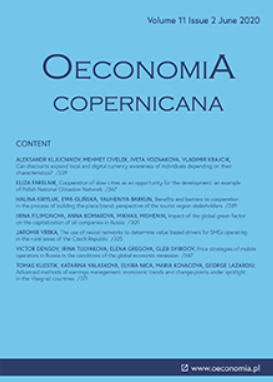Advanced methods of earnings management: monotonic trends and change-points under spotlight in the Visegrad countries
Advanced methods of earnings management: monotonic trends and change-points under spotlight in the Visegrad countries
Author(s): Tomas KLIESTIK, Katarína Valášková, Elvira Nica, Mária Kováčová, George LăzăroiuSubject(s): Business Economy / Management, Economic history, Economic development, Transformation Period (1990 - 2010), Present Times (2010 - today), Accounting - Business Administration
Published by: Instytut Badań Gospodarczych
Keywords: business finance; change-point; earnings management; monotonic trend; European countries;
Summary/Abstract: Research background: Enterprises manage earnings in an effort to balance their profit fluctuations to provide increasingly consistent earnings in every reporting period. Earnings management is legal and very effective method of accounting techniques and may be used to obtain specific objectives of the enterprises involving the manipulation of accruals. Therefore, there is a need to analyze it in the context of group of countries, while the issue of their detection in the new ways appears. Purpose of the article: The analysis of annual earnings before interest and taxes (EBIT) of 5,640 enterprises from the Visegrad Four during the period 2009–2018 confirms that the development of earnings management in these countries is not a randomness. Thus, the aim of this article is to determine the existence of positive trend in earnings management and to detect the change-point in its development for each Visegrad country. Methods: Grubbs test, Mann-Kendall trend test and Buishand test were used as appropriate statistical methods. Mann-Kendall test identifies significant monotonic trend occurrence in earnings manipulation in every country. Buishand test indicates significant years, which divides the development of EBIT into two homogenous groups with individual central lines. Findings & Value added: Based on the statistical analysis applied, we rejected randomness in the managing of earning, but we determined the trend of its increasing. The positive earnings manipulation was not homogenous in the analyzed period, however, a change-point was defined. Year 2014 was identified as a break-point for Slovak, Polish and Hungarian enterprises considering the earnings manipulation. Year 2013 was detected as a change-point in Czech enterprises. The methodical approach used may be very helpful for researchers from other countries to determine, detect and understand earnings management as well as for the investors to make decisions based on a specificities of an individual country.
Journal: Oeconomia Copernicana
- Issue Year: 11/2020
- Issue No: 2
- Page Range: 371-400
- Page Count: 30
- Language: English

